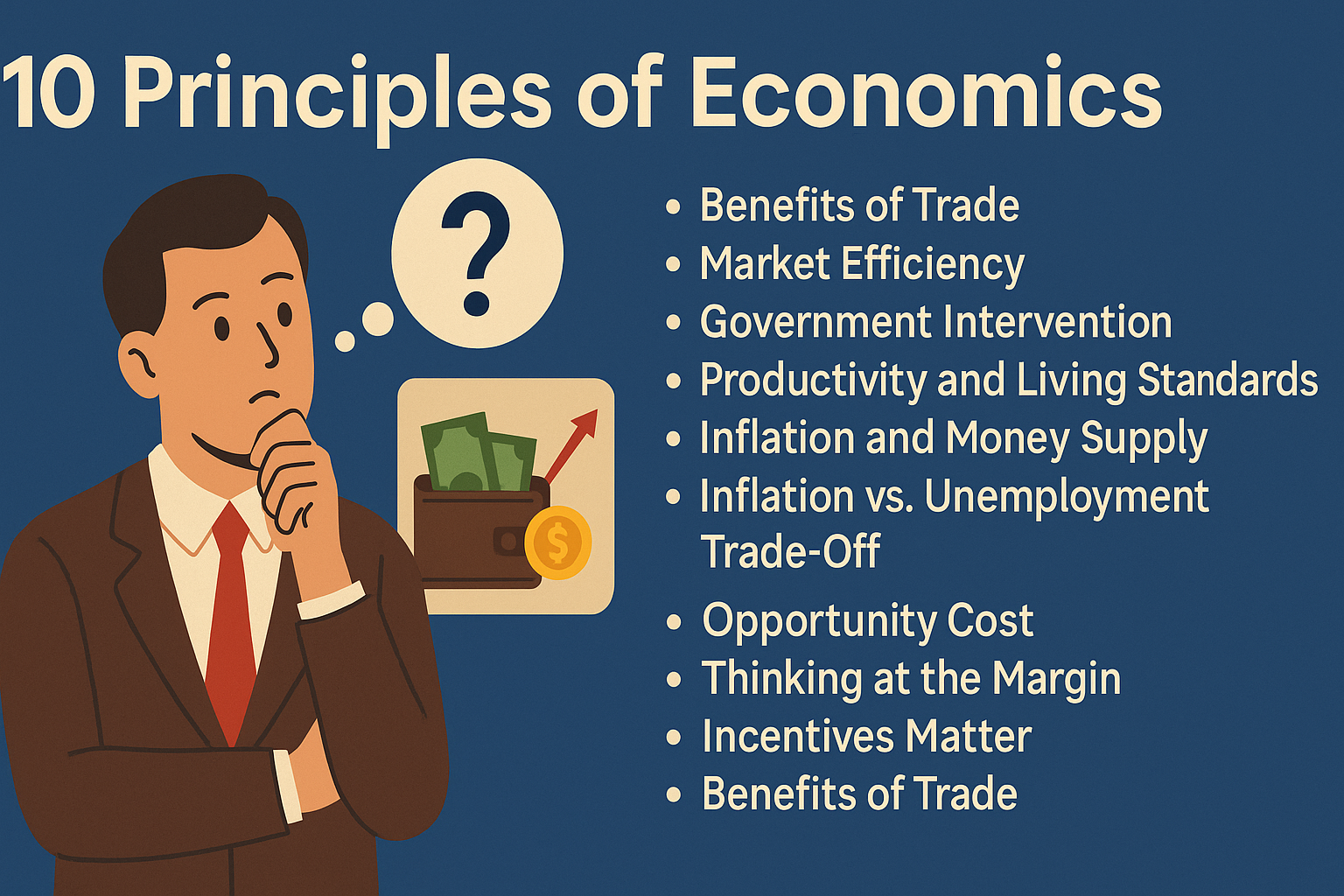The fundamental concepts or guidelines that describe how people, organizations, and governments make choices when resources are few are known as the principles of economics. These ideas aid in our comprehension of how the economy runs, how individuals react to incentives and costs, and how governments and markets work together to effectively distribute resources.
The Advantages of Understanding Economic Principles
There are several benefits to knowing the fundamentals of economics:
- Aids in making wise financial choices for oneself
- Enhances market comprehension and business tactics
- Lays the groundwork for learning more complex economics
- Helps decision-makers address practical economic issues
- Promotes careful analysis of costs, benefits, and trade-offs
These ideas provide useful tools for daily living, regardless of whether you’re a student, business owner, or simply someone looking to better comprehend the world.
1. Individuals Must Make Trade-Offs
Every choice entails sacrificing something in order to get something else. For instance, learning requires sacrificing leisure time. Governments also have to make trade-offs; for example, increasing military expenditure may result in lower spending on healthcare or education.
2. The Cost of Opportunity
What you give up when you choose one choice over another is known as the opportunity cost. Knowing this enables you to consider the true costs of your choices. Future savings are the opportunity cost, for example, if you decide to purchase a new phone rather than save money.
3. Reasonable Individuals Consider the Periphery
Economists believe that humans weigh marginal costs and rewards while making choices. A company could wonder whether they should make one additional unit of a product. It’s a sensible choice if the advantages exceed the disadvantages.
4. Individuals React to Rewards
Rewards and punishments are examples of incentives that have a significant impact on behavior. For instance, individuals may decide to drive less if gasoline costs rise. Discounts and sales encourage customers to make larger purchases.
5. Trade Can Improve Everyone's Situation
Trade enables people and nations to focus on their strongest areas and trade for necessities. More efficiency and mutual gain result from this. Task division is beneficial even within a family.
6. Markets are often an effective means of structuring economic activity
Many people engaging in marketplaces make choices regarding production and consumption in the majority of economies. Prices act as indicators that direct how resources are distributed. Effective marketplaces encourage productivity and creativity.
7. Market Results Can Be Improved by Governments
Markets don’t always distribute resources effectively. Public goods like national security and externalities like pollution are common causes. Through legislation, taxes, and subsidies, the government may assist improve results in certain situations.
8. A Nation's Production Determines Its Standard of Living
A nation’s level of life is determined by its workforce’s productivity, or how much each worker creates in an hour. greater earnings and a greater standard of living are often enjoyed by nations that make investments in infrastructure, education, and technology.
9. When governments print too much money, prices go up.
When the overall level of prices rises, inflation takes place. The excessive expansion of the money supply is one of the primary causes of inflation. One of the main responsibilities of monetary authorities and central banks is controlling inflation.
10. In the short term, society must choose between unemployment and inflation
Short-term unemployment may increase if inflation declines, and vice versa. The Phillips Curve connection is the name given to this. These trade-offs must be taken into account by policymakers when deciding on interest rates and government expenditures.
In conclusion
A helpful foundation for comprehending decision-making, human behavior, and how the economy operates is offered by the principles of economics. By understanding these 10 fundamental concepts, students and professionals can make better decisions in business, public policy, and everyday life. These ideas are not only theoretical they are practical tools that apply to daily choices and real-world issues.


